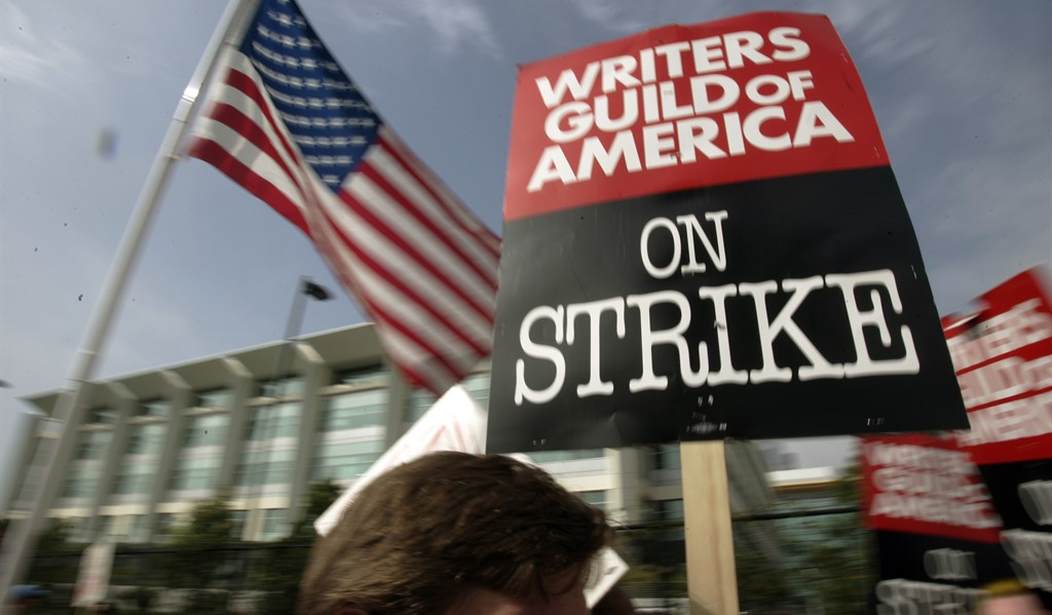The strike by the Writers Guild of America dragged on for almost five months before coming to an end this week. (Did you notice? I can’t say that I did.) The studios made a few concessions to the union in terms of residuals for material shown on streaming services and the number of writers that shows must employ. But when the Associated Press reported on this development, they focused on what they saw as a major victory for the guild. The studios will impose harsh restrictions on the use of Artificial intelligence. In fact, the title they settled on was, “In Hollywood writers’ battle against AI, humans win (for now).” This is being touted as a major win for humans over machine intelligence, but the victory may prove to be short-lived.
After a 148-day strike, Hollywood screenwriters secured significant guardrails against the use of artificial intelligence in one of the first major labor battles over generative AI in the workplace.
During the nearly five-month walkout, no issue resonated more than the use of AI in script writing. What was once a seemingly lesser demand of the Writers Guild of America became an existential rallying cry.
The strike was also about streaming-era economics, writers room minimums and residuals — not exactly compelling picket-sign fodder. But the threat of AI vividly cast the writers’ plight as a human-versus-machine clash, with widespread implications for other industries facing a radically new kind of automation.
As usual, I have issues with the terms of the settlement, but that’s true of most union negotiations we see. Forcing shows to employ a certain number of writers just to keep your members on the payroll does nothing to improve the quality of the final product if the producers believe the work could be done with fewer people. And it drives up production costs, quite possibly keeping some shows off the air, so nobody winds up having a job. The question of residuals versus streaming services is a complicated one, but sometimes people have to adapt as technology continues to alter how the world operates.
The AI question is something else, however. If the agreement is formally adopted, production companies will be forced to disclose to writers whether any material given to them has been created by Artificial Intelligence either partially or in full. AI will not be allowed to be credited as “a writer” and it can’t be used to generate “literary material.” (The definition of that seems a bit vague.) The contract also forbids any use of AI that might “undermine a writer’s credit or separated rights.”
This has been a concern of particular interest to writers of all stripes (including bloggers) ever since ChatGPT broke out and began to go global. Why pay a human being if a computer program will do the work for free? But at least up until now, I haven’t seen it as much of an immediate threat. In the few cases where news publishers have tried to turn over some content creation duties entirely to generative AI, the results have inevitably gone badly, sometimes in a hilarious fashion. The reality is that AI isn’t as flawless as editors demand their writers to be when seeking to meet professional standards. AI still gets a lot of things wrong, particularly when dealing with recent developments that it may not have been trained on. And sometimes it simply makes things up, a phenomenon that its creators refer to as “hallucinating.”
So for now, you would still need a human writer to work in partnership with AI and edit its work. But that’s really not the same as being “a writer.” And even if you think of it as a “writing job,” any operation using AI would almost certainly require fewer writers. All of that may be changing in the not-too-distant future, however. I’m a subscriber to the latest beta version of ChatGPT and I can assure you that it’s getting a lot better. I’m noticing fewer mistakes and a tendency for the program to admit when it can’t find any information on a particular topic. (Something that the original models were completely unable to do.) Could it write a script for a half-hour television program if you gave it the names of all the characters and a description of their personalities? Maybe. But you’d probably need to fine-tune it over several iterations. But in another generation or two, it may be indistinguishable from the output of human writers.
So what does this mean for the future of human writers, particularly in Hollywood? Can they really keep the door locked and shut AI out of the process indefinitely? Or will the production studios eventually tell the unions to pack sand and simply go with a fully robotic writer’s room? In the end, it’s all about audience share and profits, just like any other business. So the writing may be on the wall at this point if you’ll pardon the pun.








Join the conversation as a VIP Member